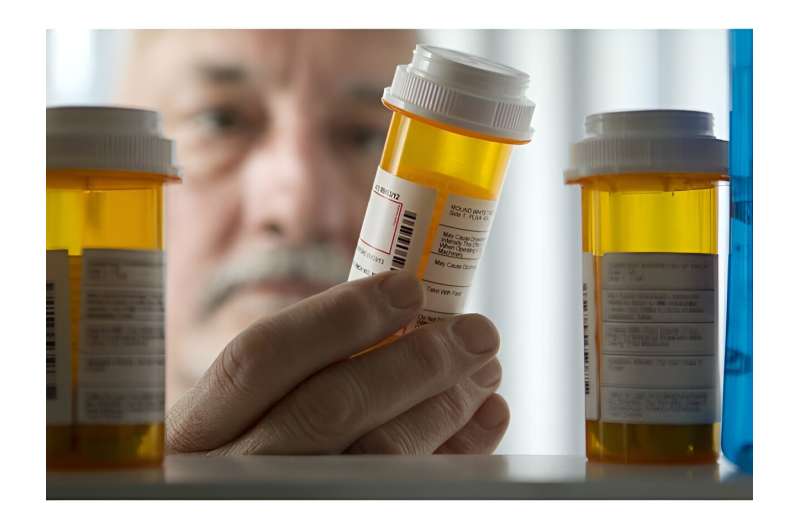This article has been reviewed according to Science X's editorial process and policies. Editors have highlighted the following attributes while ensuring the content's credibility:
fact-checked
reputable news agency
proofread
Seniors, FDA has 5 medication tips to keep you safe

When settling into your senior years, you need to be especially careful when taking medicines, herbal remedies and supplements, the U.S. Food and Drug Administration says.
That's because older adults are likely to use more prescription and over-the-counter medications, which increases the risk of harmful side effects and drug interactions, the FDA said in a news release.
In addition, physical changes associated with aging can affect the way your body handles medications, and even how different medicines work in your body.
For example, the liver and kidneys might not work as well as they do for younger people, which can affect how a drug breaks down and leaves the body.
Even medications that worked well for a person during their youth and middle age might need to be adjusted or changed later in life, the FDA says.
Keeping all that in mind, the FDA has some important safety tips:
Take medication as prescribed.
The best medicine in the world won't work unless taken correctly. Take prescriptions following the directions on the label and your doctor's instructions.
For example, medicines that treat chronic conditions like high blood pressure, high cholesterol and diabetes work only when taken regularly and as directed.
Don't skip doses or stop taking a prescribed drug without first consulting with your doctor. Not taking medicine as prescribed can lead to even worse illness, and potentially even hospitalization and death.
Antibiotics are a good example of this. Many antibiotics must be taken for the full length of time prescribed, even if symptoms have gone away. Stopping before the full course is done risks the infection returning in a stronger, more drug-resistant form.
You should also avoid taking medicine that's been prescribed to others. Doctors plan a person's medication taking into account potential side effects and drug interactions. Taking another person's prescriptions can cause unexpected side effects or dangerous reactions.
Store medicines properly.
Storing medications properly helps them remain safe and effective.
Most medicines are best kept in a cool, dry place. Avoid exposing drugs to extreme heat or cold. For example, don't leave meds in a car in the summer or winter.
Also keep medicines stored up and away from children, who might be tempted to take a medicine because it looks like candy.
Be sure to check the expiration date of medications and discard expired drugs promptly. Expired medicines might not work as effectively or actually do harm. Further, people with serious or life-threatening illnesses can be at higher risk of potential harm from expired meds.
Watch out for potential drug interactions and side effects.
Medication interactions occur when something ingested affects the way a drug functions, causing dangerous side effects.
These interactions aren't limited to prescription drugs. Over-the-counter remedies, herbal remedies and supplements can also cause a drug interaction.
Even common foods and drinks can cause serious interactions with medications. For example, grapefruit juice can affect how some medicines work.
Drug labels should contain information on potential interactions. Doctors and pharmacists also can help you avoid interactions.
Some drugs can also cause side effects that mimic other health problems, like memory difficulties, dizziness and sleepiness. You should discuss any such side effects with their doctor.
Keep a medication list
Writing down all the medicines you're taking can help you keep track of doses and detect any potential drug interactions.
The list should include the name of everything you are taking, including over-the-counter drugs, vitamins and supplements. For prescription drugs, note who prescribed it and why.
The list should be shown to all health care providers, including physical therapists and dentists. Ideally, you should keep one copy at home and another with you at all times.
More information: The U.S. Centers for Disease Control and Prevention has more about prescription medicine safety.
Copyright © 2024 HealthDay. All rights reserved.




















